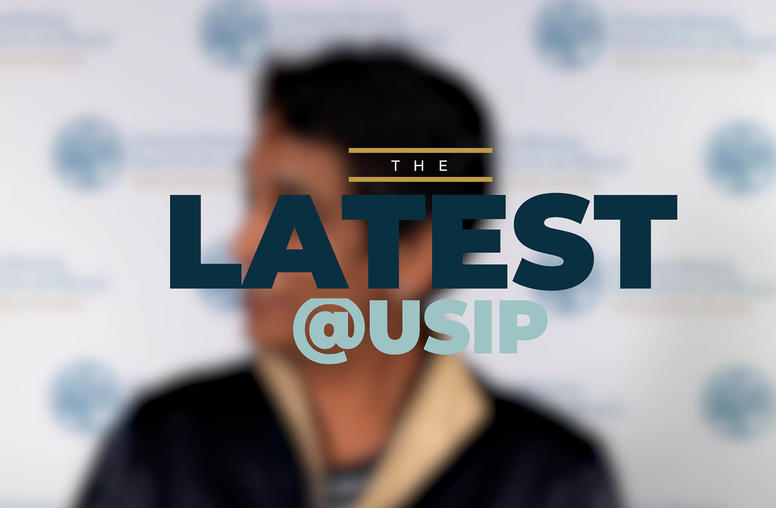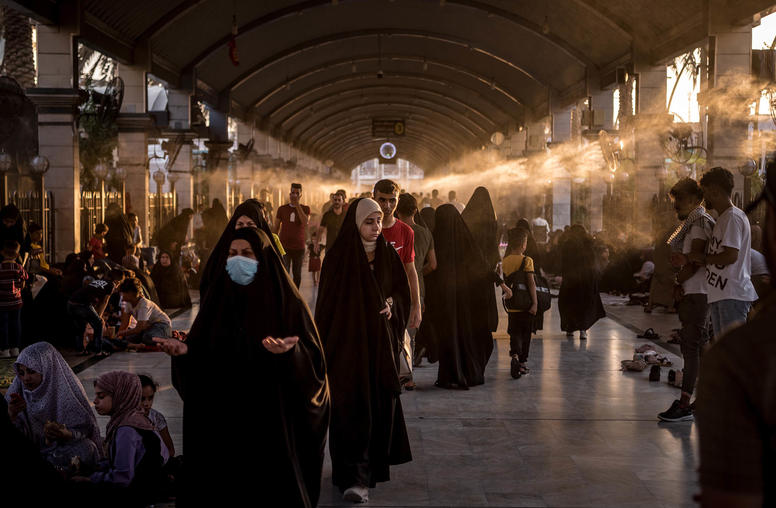Is the International Community Missing an Opportunity To Advance Peace?
Major powers should focus on opportunities to mitigate the impact of COVID-19 and build momentum for cease-fires amid the pandemic.
On March 23, U.N. Secretary-General António Guterres appealed for a global cease-fire to combat the COVID-19 pandemic. Yet over eight weeks later, the Security Council has not been able to muster consensus on a resolution to support even a humanitarian, time-limited cease-fire, despite early and repeated warnings about the potential devastation that the virus will bring to conflict zones.

While France and Tunisia have attempted to bring permanent and non-permanent members to consensus, negotiations over counterterrorism exceptions, and more recently over the inclusion of language regarding the World Health Organization—including the most recent attempt to agree on consensus language that was ultimately blocked by the U.S.—have stymied consensus, putting the credibility of the Council at risk and underlining the dire state of international cooperation in the middle of a generational global crisis. Why would multilateral action on the cease-fire still matter, especially after so many weeks of inaction?
Looking beyond the breakdown of negotiations over the latest resolution, the international community should be concerned about the long-term implications of inaction for the Security Council’s legitimacy—as well as the more immediate opportunities to advance peace and mitigate the dire human impact of the pandemic that are being lost due to multilateral stasis.
Many of the warring parties in 12 different conflicts that initially signaled support for a cease-fire—such as the separatist Southern Transitional Council in Yemen and the National Liberation Council (ELN) in Colombia—have renounced their initial support for the secretary-general’s call. Given the complexity of these conflicts and local political dynamics, the call for a global cease-fire was unlikely on its own to lead to any durable cessations of hostilities without sustained interventions from local and international mediators, and a confluence of local political factors.
Nonetheless, the lack of enthusiasm and urgency from the world’s major powers and the primary multilateral peace and security body certainly didn’t help create conditions for seizing these fleeting moments of opportunity.
The window to advance humanitarian pauses, cease-fires, and in some cases, renewed dialogues toward political settlements remains open, albeit for evolving, context-specific reasons. While some warring parties may have initially supported the secretary-general’s call to burnish their reputations or to strengthen their negotiating positions, the health and economic devastation wrought by the pandemic is altering conflict dynamics in ways that provide opportunities to forge peaceful settlements, or at a minimum, build trust among parties on the way to dialogue. At the same time, conflict actors and spoilers are increasingly seizing on opportunities afforded by the pandemic, making the need for stronger Security Council action even more urgent.
In Syria, the consequences of the pandemic in Russia and Iran—key backers of dictator Bashar Assad—may erode their resolve for continued support, heightening the appeal of international mediators' plans for a political dialogue. In Yemen, worsening humanitarian conditions could increase incentives for a cease-fire, opening space for restarting formal dialogue. Many other conflict zones are hurtling toward humanitarian calamities—including South Sudan, Democratic Republic of Congo, and Somalia.
While getting to a cease-fire in these and other asymmetric conflicts will be difficult, many of these countries are just beginning to see rises in COVID-19 cases at the same time that economic and supply chain disruptions are prompting concerning alarms from the U.N. World Food Program and others over an unprecedented humanitarian crisis. Conflict actors across the world are likely to face a stark choice in the coming months: Either accede to a pause or cease-fire to facilitate humanitarian access, or look on as the virus and famine ravages the populations they ostensibly represent.
How a Cease-fire Resolution Could Advance Peace
In this dire context, a U.N. Security Council resolution could provide critical momentum for humanitarian preparations and a framework for translating humanitarian pauses or cease-fires into structured political processes. Specifically, a resolution endorsing a global cease-fire could:
- Help improve conditions for frontline humanitarian operations. Humanitarian access in the conflicts noted above—especially in Yemen and Syria—remains severely restricted. A cease-fire on humanitarian grounds could be quickly leveraged by humanitarian actors to mount a more robust response and strengthen the basic humanitarian architecture needed to address rapidly deteriorating health, food security, and other conditions before populations reach the brink of famine.
- Authorize the creation of a formal monitoring mechanism that puts state and nonstate spoilers on notice. Spoilers could play unhelpful roles by violating and undermining negotiations for, and implementation of, local humanitarian pauses or cease-fires. A Security Council resolution and establishment of a formal monitoring mechanism would increase the costs and risks for potential spoilers that could be leveraged into positive improvements on the ground.
- Provide a framework for local and international mediators trying to take advantage of novel windows of opportunity. Security Council endorsement of the cease-fire could put wind in the sails of local mediators and peacebuilders trying to find opportunities to bring parties back into dialogue. A resolution would also strengthen and focus the mandate of U.N. envoys and special representatives whose work has been hampered by COVID-related travel restrictions.
- Signal international unity on peace and humanitarian issues. Despite its failings, the Security Council remains the primary body for international cooperation on matters of urgent peace and security. Confidence in the multilateral system was already at a low point before the pandemic. No doubt, the Security Council’s inaction has not gone unnoticed by state and nonstate belligerents worldwide. Inaction on something as straightforward as a humanitarian cease-fire in the middle of a once-in-a-century global humanitarian crisis does not bode well for the Council’s legitimacy or efficacy in the future, and could bleed into other critical areas where the Council needs to play a key role.
The world’s major powers should be leading the way out of this crisis, while taking advantage of every opportunity to advance peace. The secretary-general’s call for a global cease-fire was not just an appeal to our better angels; cease-fires are a pragmatic step to mitigate the impact of the ongoing catastrophe, and open new possibilities for peaceful recovery.



